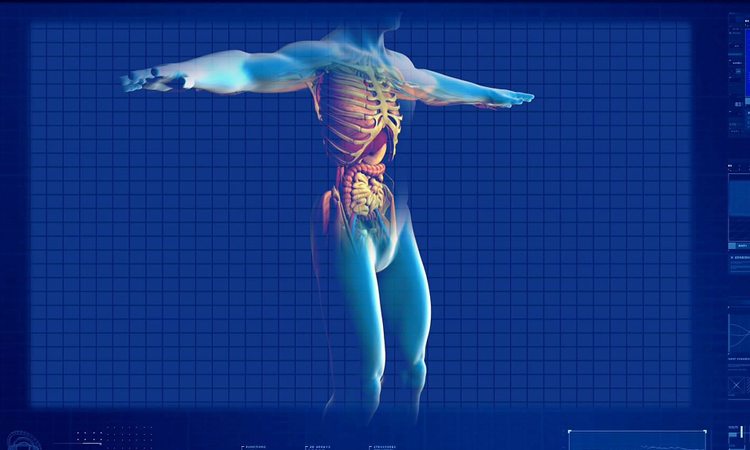|
The Translational Genomics Research Institute (TGen), an affiliate of City of Hope, played a key role in a nationwide study that identified a method of starving pancreatic cancer cells, opening a new treatment avenue should clinical trial results prove successful. Published today in Nature Medicine, the study — led by University of North Carolina — describes how pancreatic cancer, driven by a mutation of the gene KRAS, can be cornered into reliance on a single energy source known as autophagy, the process by which a cancer cell recycles its own parts to stay alive. The results suggest that once the pancreatic cancer is dependent on autophagy — also known as “self-eating” — a treatment strategy that stops autophagy would starve the cancer cells of nutrients needed for growth, thereby killing them. TGen computational scientist Dr. Sen Peng played a critical early role in the study by conducting RNA sequencing and analysis that identified the key genetic targets of this investigation, especially the roles played by the KRAS and ERK genes, and inhibiting autophagy as an energy source. Dr. Peng’s analysis showed that by either suppressing the KRAS gene, or inhibiting ERK, investigators could impair other potential energy metabolisms for the cancer cells, thereby making the cells more dependent on autophagy. Then, by introducing the compound chloroquine, an autophagy inhibitor, laboratory researchers were able to starve the cells. “We were tasked with using genomic sequencing to interrogate the hypothesis of the primary investigators,” Dr. Peng said. “We showed that, surprisingly, suppression of the KRAS gene actually increased, rather than decreased, the cells’ dependence on autophagy.” The study was led by two researchers at the University of North Carolina (UNC) Lineberger Comprehensive Cancer Center — Dr. Channing Der, the Sarah Graham Kenan Professor of Pharmacology at the UNC School of Medicine, and the study’s senior author; and Dr. Kirsten Bryant, a Research Assistant Professor, and the study’s lead author. A clinical trial will be initiated at the University of Texas MD Anderson Cancer Center in Houston based on this study: Combination of ERK and autophagy inhibition as a treatment approach for pancreatic cancer. A similar clinical trial already has begun at the University of Utah’s Huntsman Cancer Institute, where researchers discovered findings complimentary to the UNC-led team. The University of Utah findings are described in a companion study — Protective autophagy elicited by RAF→MEK→ERK inhibition suggests a treatment strategy for RAS-driven cancers — also published today in Nature Medicine. “Autophagy is a process by which cancer cells recycle materials; rather than just getting rid of them, they reuse them as a source for nutrients,” said UNC’s Dr. Der. “What we found is if you cripple perhaps the most significant pathway for energy — glycolysis — the cancer cell really starts to suffer, and it ratchets up autophagy. We found a way to make pancreatic cancers more dependent on autophagy, and in consequence, more sensitive to an autophagy inhibitor.” This year, it is estimated that nearly 46,000 Americans will die from pancreatic cancer, the nation’s third leading cause of cancer-related death. Less than 10 percent survive more than 5 years after diagnosis. The cancer often is not detected until it is in the late stages, when the cancer has spread to other organs and surgery is no longer an option. Researchers have known that a mutation in the KRAS gene is a critical driver of this cancer, but treatments that directly target the mutated gene have remained elusive. Finding ways to cut off the energy source for this cancer is one of the major directions for pancreatic cancer research. UNC’s Dr. Bryant said clinical studies are needed to determine if the treatment is tolerated and effective for patients. She began her work after losing her father to pancreatic cancer. “This may not cure pancreatic cancer, but it’s another step toward more treatment options,” Dr. Bryant said. “I’m going to keep improving this combination for future use and looking for other treatment strategies that could benefit pancreatic cancer patients.” In addition to TGen and UNC, contributing to this study were: New York University, University of Texas, University of Michigan, University of Nebraska, Duke University, George Mason University, the Roswell Park Cancer Center, and former TGen investigator Dr. Nhan L. Tran of Mayo Clinic in Arizona. Funding for this study was provided by the National Cancer Institute, the U.S. Department of Defense, the Lustgarten Foundation, and the Pancreatic Cancer Action Network/American Association for Cancer Research (AACR). Individual researchers were supported by NCI, Pancreatic Cancer Action Network/AACR, American Cancer Society, and the Deutsche Forschungsgemeinschaft (German Research Foundation). |




